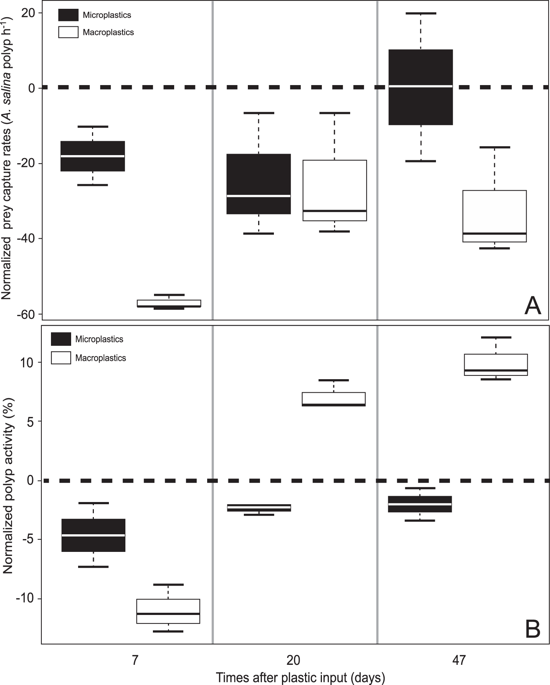Our official English website, www.x-mol.net, welcomes your
feedback! (Note: you will need to create a separate account there.)
Macro- and microplastics affect cold-water corals growth, feeding and behaviour.
Scientific Reports ( IF 3.8 ) Pub Date : 2018-Oct-17 , DOI: 10.1038/s41598-018-33683-6 L. Chapron , E. Peru , A. Engler , J. F. Ghiglione , A. L. Meistertzheim , A. M. Pruski , A. Purser , G. Vétion , P. E. Galand , F. Lartaud
Scientific Reports ( IF 3.8 ) Pub Date : 2018-Oct-17 , DOI: 10.1038/s41598-018-33683-6 L. Chapron , E. Peru , A. Engler , J. F. Ghiglione , A. L. Meistertzheim , A. M. Pruski , A. Purser , G. Vétion , P. E. Galand , F. Lartaud

|
Plastic contamination is now recognized as one of the most serious environmental issues for oceans. Both macro- and microplastic debris are accumulating in surface and deep waters. However, little is known about their impact on deep marine ecosystems and especially on the deep-sea reefs built by emblematic cold-water corals. The aim of this study was to investigate whether plastics affected the growth, feeding and behaviour of the main engineer species, Lophelia pertusa. Our experiments showed that both micro- and macroplastics significantly reduced skeletal growth rates. Macroplastics induced an increased polyp activity but decreased prey capture rates. They acted as physical barriers for food supply, likely affecting energy acquisition and allocation. Inversely, microplastics did not impact polyp behaviour or prey capture rates, but calcification was still reduced compared to control and in situ conditions. The exact causes are still unclear but they might involve possible physical damages or energy storage alteration. Considering the high local accumulation of macroplastics reported and the widespread distribution of microplastics in the world ocean, our results suggest that plastics may constitute a major threat for reef aggradation by inhibiting coral growth, and thus jeopardise the resilience of cold-water coral reefs and their associated biodiversity.
中文翻译:

宏观和微观塑料影响冷水珊瑚的生长,摄食和行为。
如今,塑料污染已被认为是海洋最严重的环境问题之一。宏观和微观塑料碎片都在地表和深水中积聚。然而,人们对它们对深海海洋生态系统的影响知之甚少,尤其是对由象征性的冷水珊瑚建造的深海珊瑚礁的影响。这项研究的目的是调查塑料是否影响主要轮作植物Lophelia pertusa的生长,摄食和行为。我们的实验表明,微塑料和大塑料都显着降低了骨骼的生长速度。大分子塑料诱导息肉活性增加,但猎物捕获率降低。它们充当了粮食供应的物理障碍,可能会影响能源的获取和分配。相反,微塑料不会影响息肉的行为或猎物的捕获率,但与对照和原位条件相比,钙化程度仍然降低。确切原因尚不清楚,但可能涉及可能的物理损坏或能量存储更改。考虑到所报道的大型塑料在当地的大量积累以及世界海洋中微塑料的广泛分布,我们的研究结果表明,塑料可能通过抑制珊瑚生长而对珊瑚礁聚集构成主要威胁,从而损害了冷水珊瑚礁及其珊瑚的复原力。相关的生物多样性。
更新日期:2018-10-17
中文翻译:

宏观和微观塑料影响冷水珊瑚的生长,摄食和行为。
如今,塑料污染已被认为是海洋最严重的环境问题之一。宏观和微观塑料碎片都在地表和深水中积聚。然而,人们对它们对深海海洋生态系统的影响知之甚少,尤其是对由象征性的冷水珊瑚建造的深海珊瑚礁的影响。这项研究的目的是调查塑料是否影响主要轮作植物Lophelia pertusa的生长,摄食和行为。我们的实验表明,微塑料和大塑料都显着降低了骨骼的生长速度。大分子塑料诱导息肉活性增加,但猎物捕获率降低。它们充当了粮食供应的物理障碍,可能会影响能源的获取和分配。相反,微塑料不会影响息肉的行为或猎物的捕获率,但与对照和原位条件相比,钙化程度仍然降低。确切原因尚不清楚,但可能涉及可能的物理损坏或能量存储更改。考虑到所报道的大型塑料在当地的大量积累以及世界海洋中微塑料的广泛分布,我们的研究结果表明,塑料可能通过抑制珊瑚生长而对珊瑚礁聚集构成主要威胁,从而损害了冷水珊瑚礁及其珊瑚的复原力。相关的生物多样性。











































 京公网安备 11010802027423号
京公网安备 11010802027423号